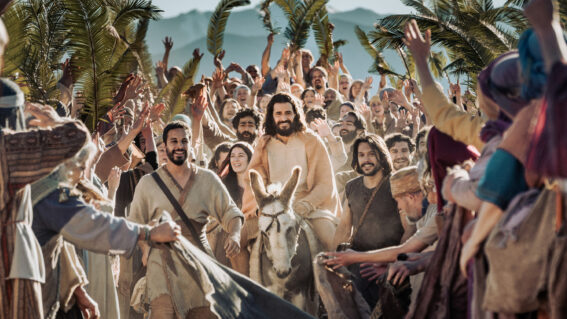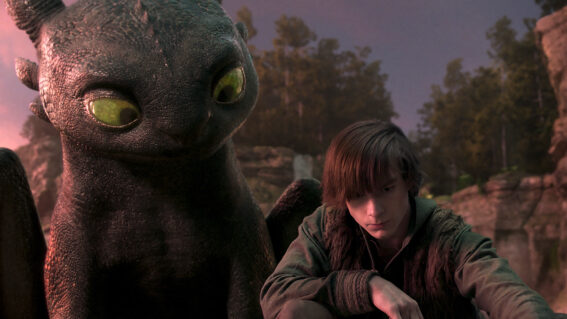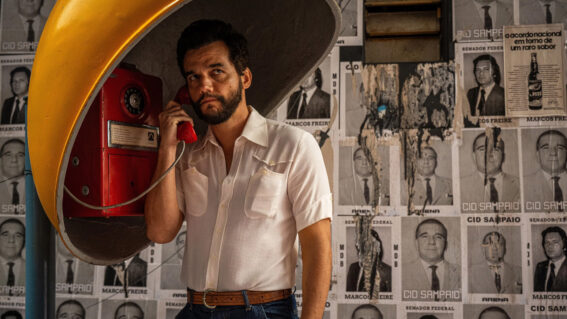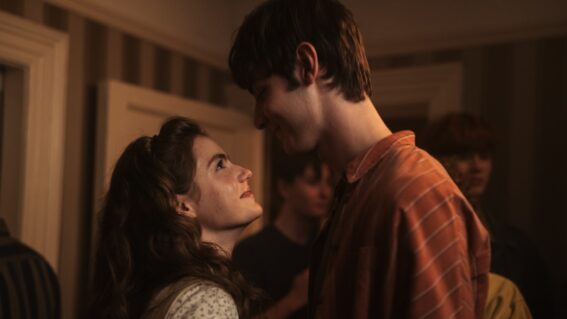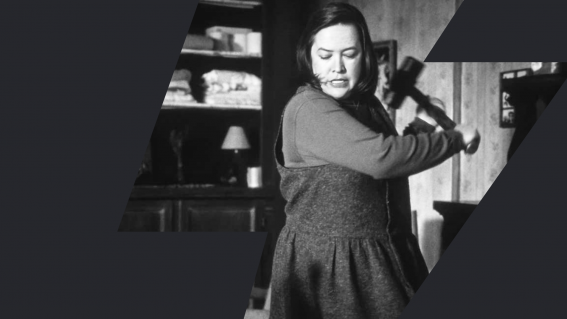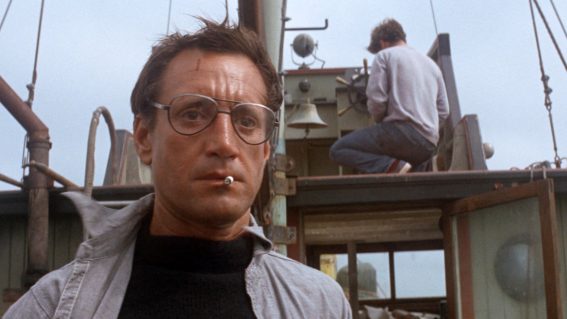The best movies of 2020
It was a terrible year for cinemas, but a good year for movies.
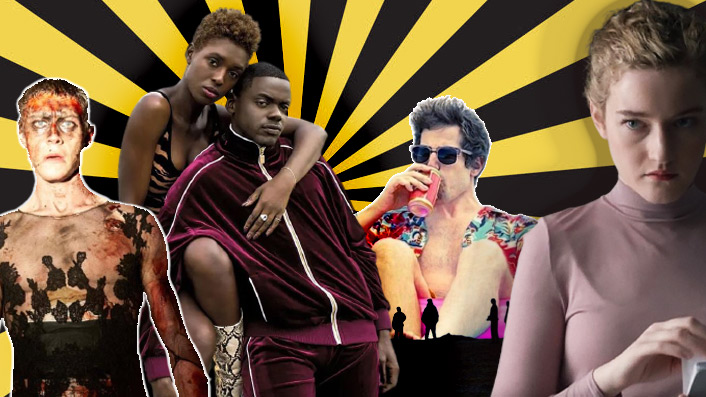
This year we were glued to our screens as the world around us ground to a halt. Critic Luke Buckmaster explains why it’s actually been a good year for movies—and picks the very best to prove it.
Countless words have been written about the dumpster fire of 2020, which has been a terrible year for cinemas—the doors of the picture palace slamming shut around the globe due to the spread of coronavirus—but a good one for movies. We received a vision of what the film world looks like with no new Marvel Cinematic Universe installments and fewer tentpole releases. And it looked good: the lack of blockbusters allowing more oxygen for smaller, edgier films that benefit greatly from word of mouth.
See also
* All new movies in cinemas
* All new streaming movies & series
Rather than simply rattling off a list of my highlights of the year (which must have received an Australian theatrical or direct to streaming release during 2020 to qualify) I have grouped them thematically, like I did last year. I find this a more interesting way to reflect on the year’s best films; hopefully you find it more interesting to read. So, without further delay…
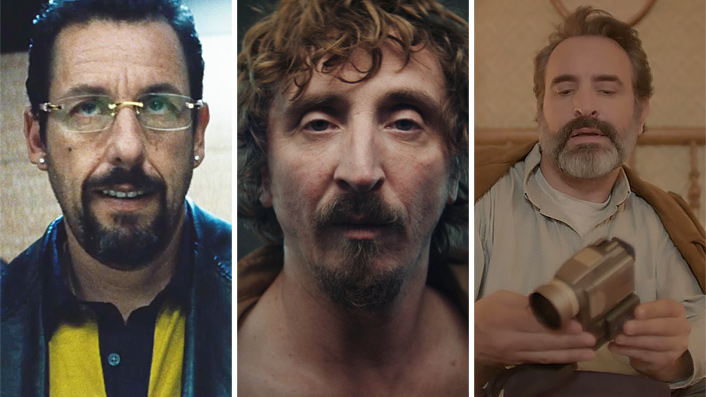
Desperate fiends: Uncut Gems, The Platform, Deerskin
In perhaps the most slappable performance yet in a very slappable career, Adam Sandler plays New York jeweler Howard Ratner in Uncut Gems, the latest gritty streetside drama from the excellent Safdie brothers. Many of Sandler’s man-child comedies are extremely irritating, bringing out strong desires to do him grievous bodily harm in even the most placid-minded viewer, but Ratner is slappable for different reasons. He’s an own-worst-energy schemer you want to beg—or scream at—to stop, as he, as they say, gets in way over his head, with all the gambling and wheeling-dealing and underhand activities. The Safdies’ work has been justifiably described as “Scorsesean” many times; this film has Marty himself on board as executive producer.
Desperation also drives the protagonist of director Galder Gaztelu-Urrutia’s violently allegorical Spanish thriller The Platform, set in a vertical prison where a platform of food and drink descends from the top once every 24 hours. People high up get a feast; those down the bottom get the dregs. Goreng (Ivan Massagué) is a rebel with a message that a better world is possible if people collaborate. The film’s socialistic politics aren’t subtle, but despite heavy handedness there’s a lot going on—including an interesting fusion of subtext and setting, the script’s themes echoed spatially in its central location. The building’s a metaphor, man.
Greed and desperation aren’t exactly the right words to describe character motivation in Quentin Dupieux’s French curio Deerskin—but then again this one of those ‘there are no words’ type experiences. Dupieux follows a deranged man (Jean Dujardin) who loves his deerskin jacket so much he decides nobody else should be allowed to wear a jacket of any kind, backing this…unusual ideological position up with a good old fashioned killing spree. The protagonist’s obsession with recording everything on his camera carries whispers of Michael Powell’s notorious thriller Peeping Tom, but for good or ill, this film is a genuine original. It made me contemplate some crazy things—such as whether the jacket itself might have directed it. I (try to) explain everything in my review.
Comedies with kooks: A Shaun the Sheep Movie: Farmageddon, La Belle Époque, Palm Springs
This year more than most we needed a good laugh, right? The original Shaun the Sheep movie is a modern masterpiece, as I have stated before, and the sequel, Farmageddon, is great too—another lovingly textured dialogue-free experience with a rare kind of visual ingenuity. A cute blue alien crashlands into the Mossy Bottom Farm, sparking a friendship with Shaun and inspiring the farmer to create a two-bit theme park in order to cash in on the crop circles. The comedy is almost entirely visual, not just steeped in the principles of pre-sound cinema but resurrecting some of the values of kammerspielfilm—a silent film genre that avoided use of intertitles.
In Nicolas Bedos’ high concept French comedy La Belle Époque, a company provides immersive theatre-like experiences for clients wanting to revisit particular moments in history. The protagonist (Daniel Auteuil) requests a recreation of the day he met his wife, which, rather than leading into the predictable ‘careful what you wish for’ or ‘you can’t relive the past’ messages, takes us to an interesting and unusual perspective on participatory narratives and storyworld creation. I wrote about the broader cultural movement the film belongs to here.
In Palms Springs the principal characters are forced to relive a wedding day over and over and over again. It’s “one of those infinite time loop situations you might have heard about,” says Nyles (Andy Samberg) to Sarah (Cristin Milioti), which is a way of sort of but not really referencing the granddaddy of this genre: Groundhog Day. Max Barbakow’s film could not have existed without the classic Harold Ramis comedy, building on its foundations and offering a sassy new spin on the curse of eternity—buoyed by Andy Siara’s clever and playful script.
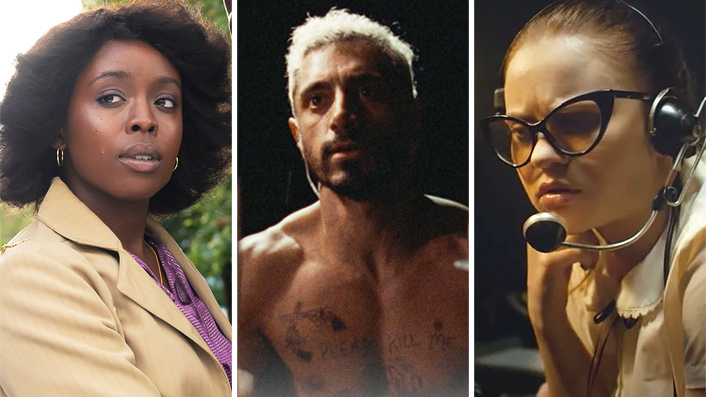
Sound and music: Lovers Rock, Sound of Metal, The Vast of Night
Steve McQueen’s sublime period piece Lovers Rock (one of five films in his Small Axe series) takes place over a single night in 1980, the vague slithers of a storyline involving a young couple (Amarah-Jae St. Aubyn and Shaniqua Okwok) attending a house party in London. Pared-back and semi-experimental, this tonally gorgeous work is captured with lovely hazy colour grading, representing the misty, melting forms of memory. McQueen’s camera is drawn to the dancefloor like a magnet, and he has a knack for recording simple moments of intimacy—two eyes locking, a hand on the back of a neck—while bobbing and gliding along with the revellers. The camera’s having a great time too.
Not sure I’d want to attend a party where punk-metal drummer Ruben (Riz Ahmed)—the protagonist of Sound of Metal—is playing; music from the film’s opening gig felt like C4 detonated in my eardrums. We are accustomed to the camera illustrating a character’s visual perspective, but not so much for audio being used to illustrate hearing, which is an important part of Darius Marder’s moving character study. The protagonist discovers he’s going deaf and is ordered to immediately avoid loud noises, triggering a contemplation of loss and a sort-of redemption story that never takes the easy or obvious routes.
The Vast of Night isn’t about music, but sound is crucial. The protagonist (Jake Horowitz) is a radio host in a backwater American town circa the 1950s, who plays a mysterious recording supplied to him by a switchboard operator (Sierra McCormick). Is it evidence of a UFO, or somebody standing too close to a washing machine? People phone in and there are long, literary style monologues dripping with unselfconscious old-timey mystery. Debut director Andrew Patterson brings the spirit of a first-time filmmaker throwing everything into it; think Richard Kelly’s Donnie Darko or Rian Johnson’s Brick.
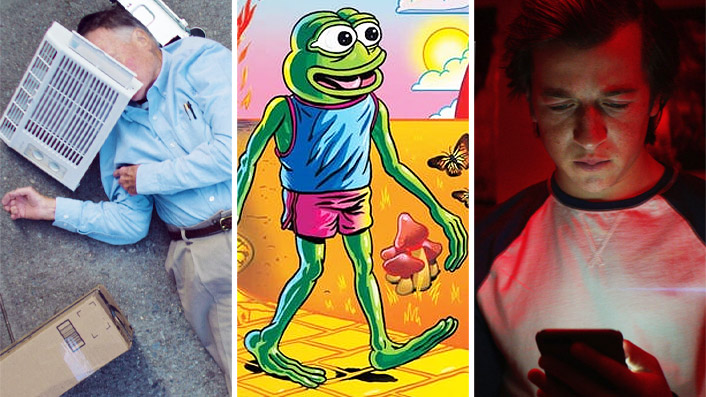
WTF documentaries: Dick Johnson is Dead, Feels Good Man, The Social Dilemma
I greatly enjoyed spending time with Dick Johnson—and I loved watching him die. Dick is the real-life elderly father of the director of Dick John is Dead, Kirsten Johnson, who knows her sweet dementia-suffering dad is on the way out. So she does what any, erm, reasonable daughter would do, and depicts various creative ways Dick could die—these grimly amusing sketches starring the man himself, gawd luv ‘im. Weirdly cathartic and heartfelt, the film suggests Dick exists in a kind of purgatory, using the genre of the personal documentary to carve out a surreal Bunuealian space.
Feels Good Man is Arthur Jones’ documentary about the turbulent life of poor old Pepe the Frog—a harmless stoned Muppet type character who was appropriated by the far-right and turned into a symbol of hate. I was slack jawed at various points, compelled and mystified, kind of shaking my head at the whole thing, following Jones struggle (in the best way: with intelligence and heart) to trace how on earth things became so weird and dark for Pepe, and also his creator Matt Furie. The film is about how artists can lose control of their own creations, and a study on how images—tumbling through pop culture’s infinite cycle—can take on meaning entirely divorced from their origins.
The idea of not being able to put the genie back in the bottle is explored in a technological and behavioural context, rather than an artistic one, in Jeff Orlowski’s The Social Dilemma, a timely and important work investigating the potentially catastrophic effects of social media networks onto human societies. Orlowski brings together a group of Silicon Valley insiders to discuss how tech giants exploit psychological vulnerabilities through various means, such as intentionally addictive interfaces. All this is very interesting, but the film really starts smoking when it examines how online echo chambers present starkly different impressions of the world, hypothesizing about how this seeming absence of a root reality might even pose an existential threat to the human race. Fascinating and bone-chilling.
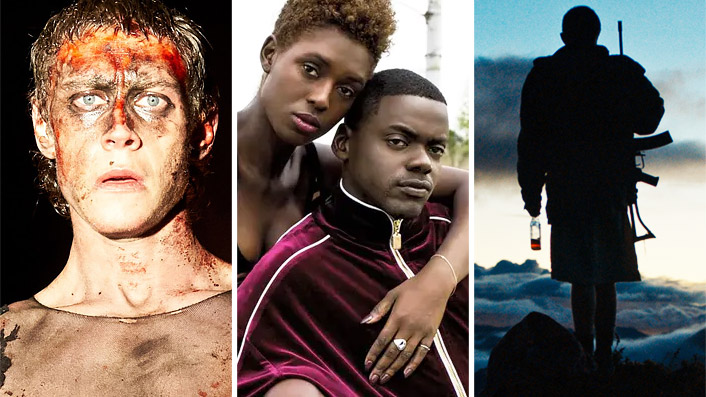
Doomed people: True History of the Kelly Gang, Queen & Slim, Monos
There’s been many films about old mate buckethead Ned Kelly; even the world’s very first narrative feature. Justin Kurzel’s ferociously energetic and punkish True History of the Kelly Gang is the cool kid arriving late to the party, with a different and pricklier agenda, turning the very concept of realism into something old-hat and passé. The electrifying strobe light-infused Glenrowan shootout scene is one of the standout moments of 2020—the protagonist not just facing down cops but the inevitability of his own legend.
If Kelly was doomed by iconoclasm, the lead characters in Melina Matsoukas’ hard-hitting but romantic road movie Queen & Slim don’t get the luxury of pursuing their destiny; they suffer their fate. On the way home after a first date Slim (Daniel Kaluuya) and Queen (Jodie Turner-Smith) are pulled over by a white police officer who creates an altercation that results in his own death. The pair must decide whether to turn themselves in and go behind bars, or hit the gas and take whatever freedom they can get. They can’t stay in any one place for long, for obvious reasons, though the hot-blooded energy of this thrillingly executed film periodically slows to allow moments of tenderness.
The characters in Alejandro Landes’ exotic Columbian drama Monos never had much of a chance either: they are heavily armed teenage rebels living militarized lives on a picturesque mountaintop, tasked with managing an imprisoned American (Julianne Nicholson) in a quasi-society of their own making. Messages about innocence lost and parallels to Lord of the Flies are obvious, but the mood is Herzogian—more anthropological than literary, the exotic locations captured with an eye-watering documentary-esque look. During a year of lockdown and self-isolation, this film made me feel like I’d travelled.
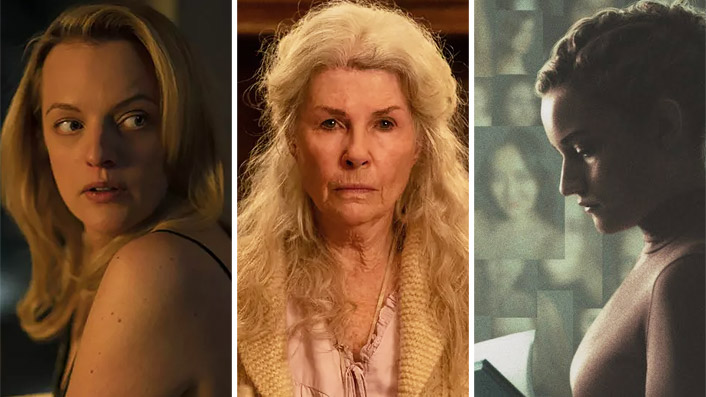
Monsters and victims: The Invisible Man, Relic, She Dies Tomorrow, The Assistant
The Invisible Man franchise has always been about dodgy men doing dodgy things—ever since Claude Rains covered himself in bandages and unsuccessfully attempted to keep a low profile in the 1933 original. Before the release of Leigh Whannell’s new film it would’ve been hard to believe there was much juice left in this series, but Whannell finds a new angle by framing it as a contemplation of domestic violence and the terror of living with a violent partner. These heavy subjects are handled accessibly, with a terrific performance from Elisabeth Moss as the terrorized protagonist, the overarching tone of The Invisible Man a kind of upper crust midnight movie.
That description could apply to Relic too, which revolves around a dementia-addled elderly woman (Robyn Nevin) who returns to her home in regional Victoria and, well, you don’t want what she’s got. Director Natalie Erika James leans on atmospheric shorthands—a misty forest, a house with creaky floorboards—but this is far from a rote genre exercise, with an usual ambience and mise-en-scene that’s literally and psychologically sticky. It clings to you, in a disgusting way.
Relic is a horror movie with plenty of feelings, but Amy Seimetz’s She Dies Tomorrow is a horror movie about feelings. Alone, drinking and depressed, Amy (Kate Lyn Sheil) is convinced she’s going to die tomorrow. A visiting friend (Jane Adams) tells her she’s crazy, or words to that effect, before she too gets the same feeling. Thus the monster, the bad guy, the spirit, the antagonist, whatever you want to call it, is nothing more and nothing less than a feeling. This bold premise is executed audaciously, visual flair compensating for a drifting plotline.
Moving away from horror, the protagonist in Kitty Green’s subtle, measured and yet unshakably powerful and affecting drama The Assistant is a victim too—of the patriarchy. Set over 24 hours in the life of a young female assistant (a commanding Julia Garner) to a Weinstein-like Hollywood producer, Green matches precise instances of sexism with a very clever kind of vagueness, communicating that gender inequality is insidious and all-pervading; it’s not something you can isolate. Long takes coupled with diegetic sound effects (such as the whirring of scanners and computers) create a sort of compelling mundanity, showing a filmmaker in total control of all her elements.






